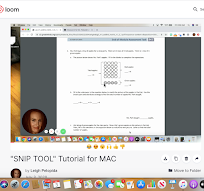Mike Wesch Ted Talk: Learning from Baby George
“Asking questions, making connections, and taking chances took us down from the trees and took us to the moon.”
~ Dr. Mike Wesch
Dr. Wesch began his talk by pointing out that the way universities are set up, and the attitudes of college students and faculty, are largely contradictory to real learning. He used his son George to demonstrate his beliefs about how students learn. His young son showed us that learning happens when students are doing something they love and when they are challenging themselves. He said "real learning is fun so you keep doing it" as we watched his son keep attempting his steps on the stairs countless times. Dr. Wesch thinks learning happens when you are not afraid of failure, when you are connected, and when the score is not the outcome you are after-rather than the learning itself.
Dr. Wesch used his observations of his son to transform his way of teaching and to align his pedagogy with his beliefs. He knew that making personal connections with his students, and understanding each one of them individually, was a way to foster learning in his students. He also finds ways for his students to be able to show their individual strengths. And really, isn't that the task of every educator? He encourages creativity and knows that there's not just one way to do something. He also encourages collaboration among his students. His illustration of the mountain and how he “scaffolds all the way up the mountain,” and how students need to all pitch in to help each other reach various plateaus, was a powerful way to demonstrate his beliefs- learning happens when students are connected, having fun, being challenged, and focused on the learning and not the grade.
I really appreciated the lengths that Dr. Wesch went to to understand his students and to connect with them. I have always felt that connecting with students is the most important thing that teachers can do. It's also what I think makes teaching so rewarding.
https://www.youtube.com/watch?v=SP7dbl0rJS0



Leigh,
ReplyDeleteI love how Dr. Wesch makes it a point to get to know his students, especially in college where classes can be large lectures. I, also, think making these connections are so important! I agree that it is every educator's job to push students in the direction of their interests. We are doing our students a disservice when we keep them in the lane of standardized testing and stifle that creativity.
Sounds like you are really articulating your own beliefs here -- CONNECTION is at the center for you. How do your actions follow this belief? Glad this inspired you :)
ReplyDeleteI really liked how Dr. Wesch made little meetings with his students to get to know them better. In the classroom, I conference with students about academics but I think I want to start having lunch bunches to build deeper connections. I also think house visits would be fun too.
ReplyDeleteLeigh I totally agree with you when you say that connecting with students is the most important thing that teachers do. It definitely is what makes our job so rewarding! This is something I have been working on through blended and personalized learning (I was part of a FUSE cohort that focused on this) and something I am currently thinking about how to go about doing if we start school in September with distance learning.
ReplyDeleteLeigh, I completely agree with you about the most rewarding part of teaching is connecting with our students. I have had the opportunity to loop with some of my students for three years. It has been an wonderful experience connecting with my students.
ReplyDeleteChristina D'Ambra
Learning is so much more than working towards good grades! Our schools are not set up to accommodate this method of thinking. You make a good point at the beginning of your post when you say that the ways in which universities are set up are often contradictory to the real ways students learn. Hopefully, we can work to change some of these habits in our own classrooms. I think our final projects can give us hope! Thanks for sharing.
ReplyDelete